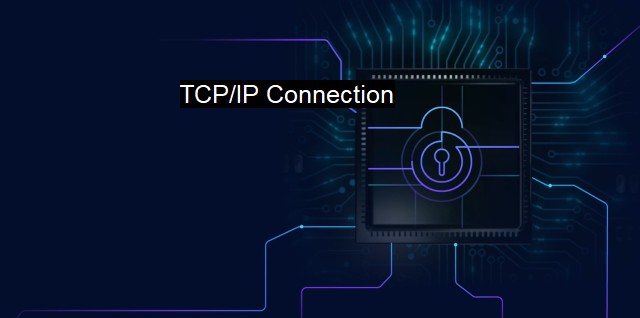What is TCP/IP Connection?
The Significance of TCP/IP Connection in Cybersecurity and Antivirus: Ensuring Secure Data Communication and Protection
TCP/IP, which stands for Transmission Control Protocol/Internet Protocol, is a basic communication language or protocol fundamentally used over the Internet. It describes how all electronic devices such as computers, smartphone, and printers should be networked over the Internet. These protocols establish the communications rules over which the internet was built.Understanding TCP/IP is crucial for a proper approach towards cybersecurity and antivirus strategies. Any security or antivirus implementation focusing on Internet communications will always involve TCP/IP as its core. A deep understanding of these protocols will assist security specialists greatly in detecting threats and any anomalies in network traffic.
The TCP/IP model comprises four primary layers: application, transport, Internet, and network interface. The application layer consists of protocols used by programs to send data; the transport layer handles data transmission; the internet layer determines the most efficient way for the data to be transmitted; and the network interface layer gives the data the physical form to help it reach the final destination.
The TCP/IP connection works as follows: when users send a request, the request (in the form of packets) is sent from the user interface down these layers on the user’s device, over the internet, and then back up these layers to the recipient device. Each stage in the process contributes to the efficiency, reliability, and security of the data transmission.
Speaking of security, TCP/IP architecture presents numerous attack vectors that might be exploited by malicious actors. Network intrusions, denial of service, IP spoofing, and man-in-the-middle attacks are among the major threats directed against the TCP/IP connection. To mitigate those potential vulnerabilities, it is important to implement robust cybersecurity practices with special attention to enterprise firewall settings, Intrusion Detection Systems (IDS), Intrusion Prevention Systems (IPS), and antivirus software.
Many firewall and antivirus systems heavily rely on TCP/IP connections. When packets are sent through an IP network from one device to another, a virtual connection commonly referred to as a ‘TCP/IP socket’ is made. Firewalls and antivirus software scrutinize, regulate, and monitor the data flowing through these sockets to identify and block potentially malicious packets based on its source, destination, and other characteristics. Firewalls, in particular, also help to handle network traffic in a more controlled manner, thus reducing the risks associated with open TCP/IP connections.
Antivirus programs, in conjunction with firewall settings, often consume these packets, inspect their digital signatures and patterns to attempt to identify previously encountered malware, spyware or viruses. Some of these security systems also run heuristic checks on packets, a sort of behaviour-based learned protection strategy that helps detect newly developed threats.
Network protection and security start at understanding of TCP/IP connections, given they are the basic unit of data transfer around the globe. A thorough understanding of the nature of these connections and the security risks involved is crucial in setting the basic groundwork for a cybersecurity strategy. It helps in the selected implementation of antivirus software, firewalls, and fine-tuning the rules of data exchange within these TCP/IP connections thereby securing systems and data from potential cyber-attacks. Thus, creating a foundation for improved online safety, information integrity, and privacy.

TCP/IP Connection FAQs
What is a TCP/IP connection, and how does it relate to cybersecurity and antivirus software?
A TCP/IP connection is a network communication protocol that allows devices to communicate over the internet. When it comes to cybersecurity and antivirus software, a TCP/IP connection is crucial as it enables the transmission of data between devices, making it an essential component for securing network communications.How can I test if a TCP/IP connection is working correctly, and why is it important to do so in terms of cybersecurity?
You can test if a TCP/IP connection is working correctly using various tools such as "ping" or "tracert." It is important to test TCP/IP connections in terms of cybersecurity as it allows you to identify any issues that could be exploited by cybercriminals, such as misconfigured firewalls, open ports, or other vulnerabilities that could leave your network open to attacks.What is the difference between TCP and UDP connections, and which one is more secure for cybersecurity and antivirus purposes?
TCP and UDP are two different protocols used for establishing connections between devices. TCP is a reliable protocol that ensures all data packets are transmitted and received correctly, while UDP is a faster protocol that is less reliable. In terms of cybersecurity and antivirus purposes, TCP is considered more secure as it provides a higher level of control, particularly when it comes to detecting and blocking malware attacks.Can an antivirus software protect me from all TCP/IP connection threats, or should I take additional measures to secure my network?
While antivirus software can protect your computer from many TCP/IP connection threats, it is not enough to rely on it entirely. You should take additional measures to secure your network, such as configuring firewalls, updating software regularly, and using strong passwords. It is also essential to educate yourself about the latest cybersecurity threats and how to avoid them.| | A | | | B | | | C | | | D | | | E | | | F | | | G | | | H | | | I | | | J | | | K | | | L | | | M | |
| | N | | | O | | | P | | | Q | | | R | | | S | | | T | | | U | | | V | | | W | | | X | | | Y | | | Z | |
| | 1 | | | 2 | | | 3 | | | 4 | | | 7 | | | 8 | | |||||||